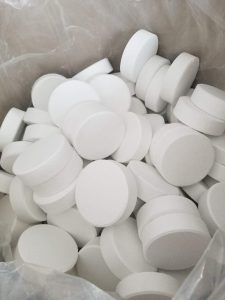Choosing the right chlorinator is crucial for maintaining pool water quality. Swimming pool chlorine powder and chlorine tablets are two common water treatment agents that have attracted much attention. Which one should we choose? This article will make an in-depth comparison of the characteristics, advantages, and applicable scenarios of swimming pool chlorine powder and chlorine tablets to help everyone better understand and maintain our swimming pools more effectively.
Swimming pool chlorine powder and chlorine tablets are common swimming pool disinfectants used to disinfect, sterilize, and prevent water from turning green and algae growth. Chlorine powder is often called swimming pool disinfectant powder, while chlorine tablets are often referred to as swimming pool disinfectant tablets or instant tablets. The main ingredient in both disinfectants is trichloroisocyanuric acid, which has similar bactericidal effects. However, there are differences in their morphology and chlorine content.
Firstly, chlorine powder exists in powder form and usually needs to be stirred and dissolved in water to be fully effective. In contrast, chlorine tablets come in tablet form, and some are even instant-dissolving tablets that break down in water more quickly to release chlorine. This allows chlorine tablets to be more quickly and evenly distributed throughout the swimming pool water body after being put in, improving the disinfection effect.
Chlorine tablets are a commonly used disinfectant, usually 2 g tablets containing 50% chlorine. This sheet-like shape makes them easy to use, as users only need to put the chlorine tablets directly into the swimming pool water. It will be completely dissolved, and the chlorine will be quickly released within a few minutes. This method eliminates the need for stirring and dissolving chlorinated tablets during use, greatly simplifying the operation process.
Due to their high concentration of chlorine
chlorine tablets can quickly replenish residual chlorine in the water and effectively disinfect and sterilize. However, it should be noted that although chlorine tablets dissolve faster, they hold chlorine for a shorter time than disinfectant powder. Especially in an outdoor swimming pool environment, the consumption of chlorine tablets will be greater, and in order to maintain the appropriate chlorine concentration, the dosage must be increased.
For this reason, chlorine tablets are more suitable for use in indoor swimming pools. Their convenient use and rapid dissolution properties make it easier to maintain proper water quality in indoor pools. Generally speaking, the advantages of chlorine tablets in disinfection lie in their convenience and rapid effect. When choosing, users should make a reasonable combination according to the specific environment and needs of the swimming pool.
How is chlorine powder usually used?
Disinfectant is a 90% chlorine-based disinfectant known for its slow dissolution. When using disinfectant powder, users need to mix it with water in advance, dilute it appropriately, and then sprinkle it into the swimming pool. Unlike chlorine tablets that dissolve quickly, disinfectant powder dissolves slowly, taking about an hour, so sufficient preparations must be made in advance.
When you put chlorine powder into a pool, it doesn’t float to the bottom very quickly; it floats in the center of the pool. Therefore, it must be at least one hour before adding to ensure that the added amount is completely dissolved in water. This feature requires users to have more time to plan when using chlorine powder.
However, it is worth noting that although the chlorine powder dissolves relatively slowly, the remaining chlorine lasts longer. In this way, chlorine powder can effectively disinfect outdoor swimming pool water, especially those places where appropriate chlorine levels need to be maintained for a long time.
In short, chlorine powder and chlorine tablets in swimming pools each have their own characteristics and application situations. When selecting an appropriate chlorinating agent, the size, frequency, water quality requirements, and personal preferences of the pool should be comprehensively considered. No matter which one it is, it must be put in and used scientifically and rationally based on the actual situation to ensure that the water quality of the swimming pool is clear, hygienic, and safe, providing users with a pleasant swimming environment.




